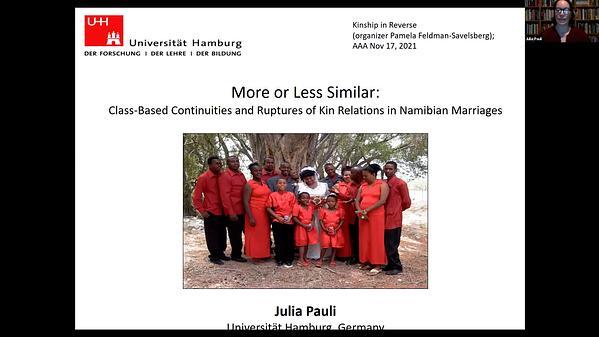Would you like to see your presentation here, made available to a global audience of researchers?
Add your own presentation or have us affordably record your next conference.
keywords:
africa
immigration and diasporas
kinship and families
Is kinship moving in reverse? Are material and emotional expectations increasing beyond possible fulfillment, and then boomerang back like a snapped rubberband, leaving kinship obligations diminished or unfulfilled? Frustrations and not giving the expected are a central part of kinship. Many “classic” studies address kinship and conflict, including succession disputes and witchcraft as key expressions of the so-called dark sides of kinship (Geschiere). Examples abound regarding secrets and challenges to kinship as an unambiguously positive “mutuality of being” (Sahlins). What do these kinship troubles look like today? Current social contexts may be turning disappointed expectations into new patterns and norms. This double session examines cases in which highly valued kinship obligations get “rolled back,” and explores the varied contexts in which these transformations occur. We consider how models from classic ethnographies of kinship conflict can be applied, adapted, or challenged vis-à-vis current situations. We highlight migration, class differentiation, and the impossibilities engendered by both economic challenges and climate change. The panelists in our paired session address a set of guiding questions: What are the circumstances in which people retreat from normative kinship obligations? From which obligations do they retreat? What reasoning do they give (if at all) for their retreats? What are the consequences for changing notions or organization of kinship and social life? Are conditions changing such that we see something new regarding “kinship in reverse?” Do actors classify contemporary diversions from traditional norms as “bad” kinship, or are they changing the norms themselves? Do the challenges of transnational lives reverberate to transform kinship in multiple locales? Through these guiding questions, the panelists in this second of two linked sessions address broad questions as well as deeply contextualized ethnographic particulars. For example, papers investigate how various institutional contexts•including schools, nursing homes, and immigration regimes•affect the types of responsibility kin feel for one another. We explore the unintended consequences of kinship actions, such as when efforts to evade one type of kinship betrayal produce another. Panelists uncover tension between kinship affect in the private sphere and its expression in public arenas, be they funerals or kinship activism surrounding sons lost to jihad. Our papers reveal the variable tempo of kinship changes, which affect relatives at different paces, and map onto axes of social differentiation such as gender, class, and urban vs. rural settings. Our contributions explore conflicts regarding kinship obligations among a range of actors, including children, parents, siblings, spouses, and elders. These conflicts revolve around care of children, the sick, the dying, and the dead. They address responsibility, affect, and the quality of care (for example, is hardship a loving way to teach resilience, or is it abuse?). They ask ethnographic questions about who counts as kin, and who retreats from kinship relationships. Our cases address a variety of North African and sub-Saharan African countries (Benin, Cameroon, Ghana, and Tunisia) and their diasporic destinations (France, Germany, Iraq, Libya, Syria, and the United States).

